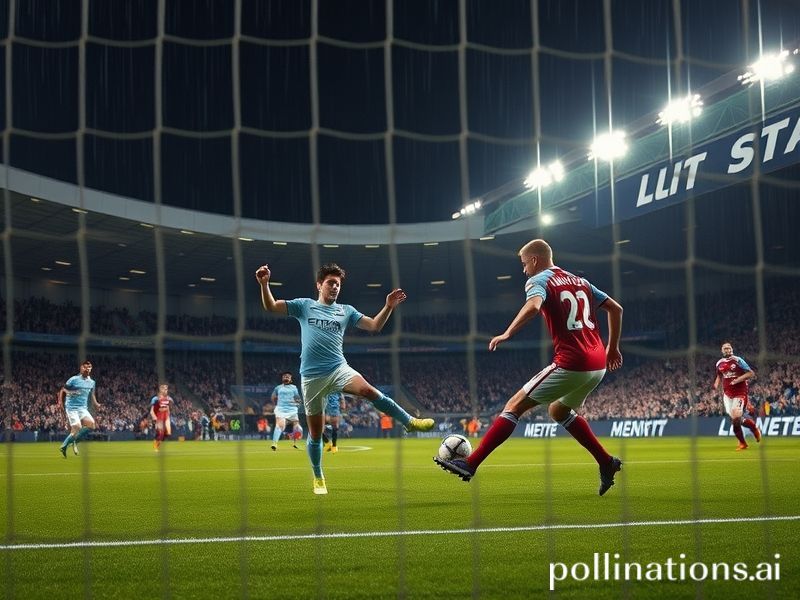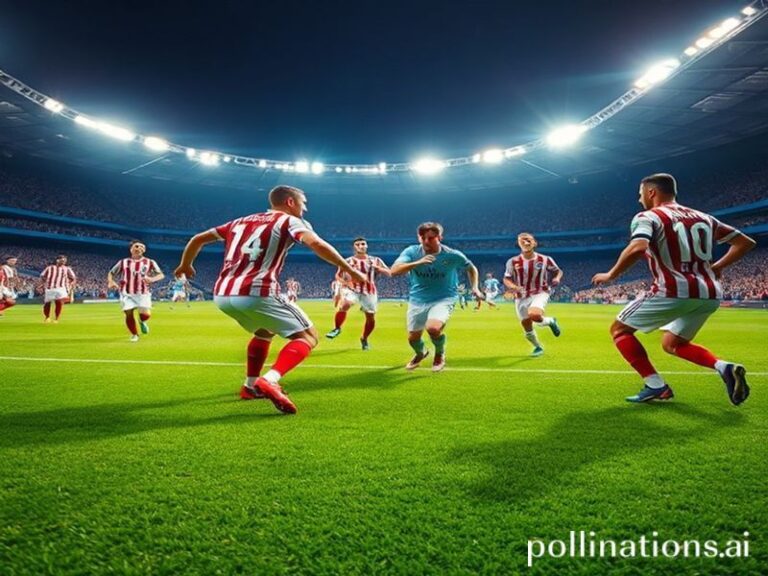Huddersfield vs Man City: When David Forgot the Sling and Goliath Brought a Drone Strike
Huddersfield vs Manchester City: A Parable of Empire, Disappointment, and the Global Gluttony for Spectacle
By our man in the cheap seats, somewhere between Brexit and bankruptcy
Let us begin with the obvious: Huddersfield Town, population roughly equivalent to a mid-tier Indonesian shopping mall on Singles’ Day, were never meant to be here. They are the footballing equivalent of the last dodo who forgot the memo about extinction and waddled onto Noah’s Ark anyway. Manchester City, meanwhile, are the Ark—sleek, turbo-charged, and insured by Abu Dhabi for more than the GDP of several Pacific micro-nations. When they meet in the FA Cup, it is not David vs Goliath; it is Goliath vs Goliath’s unpaid intern.
Still, the world watches, because that is what we do now. In Jakarta, ride-hailing drivers huddle under tin roofs streaming the match on cracked phones, praying the data package lasts longer than Huddersfield’s resistance. In Lagos, betting shops offer 200-1 odds on a Town win, odds so insulting they feel colonial. In Buenos Aires, insomniac fans debate whether Guardiola’s positional play could solve Argentina’s inflation (spoiler: it can’t). The planet’s attention span is now exactly 90 minutes plus stoppage time—long enough to sell VPN subscriptions and cryptocurrency no one understands.
The geopolitical subplot is equally delicious. Huddersfield’s shirt sponsor is a local boiler company whose annual turnover wouldn’t cover Erling Haaland’s weekly manicure. City’s chest advertises Etihad Airways, a subtle reminder that nation-states now field club teams the way Renaissance princes once bankrolled painters—except the Medicis never needed Financial Fair Play audits. Somewhere in Washington, a congressional aide files this under “soft power,” right between Eurovision and Korean boy bands.
On the pitch, the mismatch is operatic. Huddersfield’s midfield runs on Yorkshire grit and probably actual grit; City’s runs on GPS-tracked mitochondria harvested from Norwegian cyborgs. The Terriers’ star striker once scored 17 goals in League Two; Haaland scores 17 goals before his morning algae shake. Yet for 23 glorious minutes, Huddersfield hold the line, prompting a flurry of smug think-pieces about the death of superclubs—until City remember they’re contractually obligated to win by three, and do.
The real tragedy, if you’re feeling existential (and these days, who isn’t?), is that nobody truly loses. Huddersfield pocket a few million in TV revenue, enough to patch the stadium roof and maybe buy a defender who isn’t on loan from someone’s U-12 squad. City advance, their quadruple chase intact like a hedge fund that keeps finding new bubbles. Even the fans are complicit: Huddersfield supporters will dine out on “that tackle in the 34th minute” for decades; City fans will complain the victory wasn’t stylish enough, like Marie Antoinette sighing about the cake’s frosting.
Meanwhile, the planet smolders. Somewhere in the Arctic, an ice shelf calves into the sea the exact moment Phil Foden nutmegs a Huddersfield fullback. In Kyiv, air-raid sirens compete with Champions League anthems. The absurdity is not lost on anyone, yet the stream buffers on. Because sport, unlike life, promises final whistles and neat narratives, even when the narrative is “inevitability wrapped in polyester.”
Final score: City 4, Huddersfield 0. The global audience disperses to doom-scroll about war, recession, and the next iPhone. But somewhere in West Yorkshire, a kid who watched his team get outclassed still swears he felt hope for 23 minutes. That, in our current timeline, counts as an act of rebellion—tiny, futile, and gloriously human.







